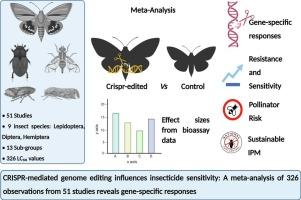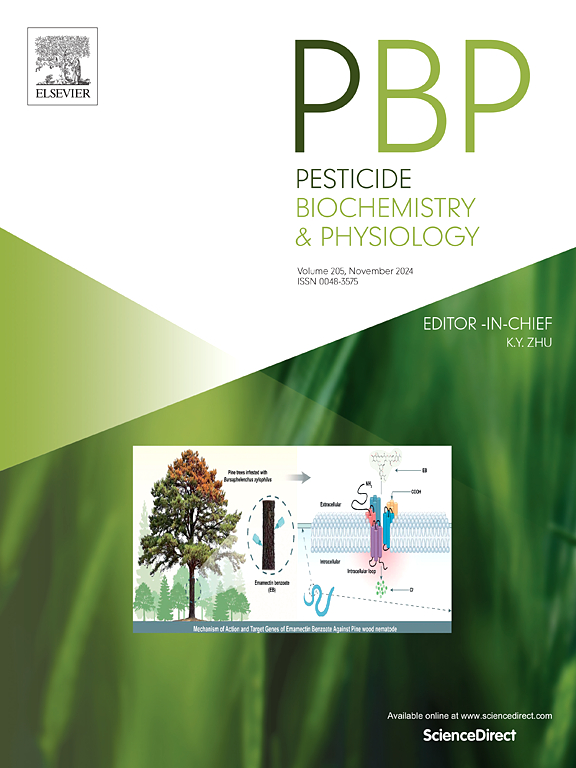Genome editing of detoxification gene repertoires in insects using clustered regularly interspaced short palindromic repeats (CRISPR): A systematic review and meta-analysis
IF 4
1区 农林科学
Q2 BIOCHEMISTRY & MOLECULAR BIOLOGY
引用次数: 0
Abstract
Decoding the molecular mechanisms underlying insect resistance to insecticides and host plant adaptation is essential for effective and sustainable Insecticide Resistance Management (IRM). Reverse genetic approaches targeting “target site resistance” can help control pests without harming pollinators and beneficial biocontrol agents. Understanding the role of mutations involved in xenobiotic resistance enables the judicious use of pesticides. CRISPR-based genome editing allows precise manipulation of detoxification genes, helping to decipher their roles in resistance development. This review provides a comprehensive overview of CRISPR-mediated genome editing in insect detoxification genes and their involvement in resistance mechanisms. In addition to synthesizing overall data trajectories, we present study-level effect sizes that highlight context-specific responses to gene editing, offering insights that can inform future experimental designs and functional validation studies.

利用聚类规则间隔短回文重复序列(CRISPR)对昆虫解毒基因库进行基因组编辑:系统综述和荟萃分析
破解昆虫对杀虫剂抗性和寄主植物适应的分子机制对于有效和可持续的杀虫剂抗性管理(IRM)至关重要。针对“靶点抗性”的反向遗传方法可以在不伤害传粉媒介和有益生物防治剂的情况下帮助控制害虫。了解突变在外源抗药中的作用,可以使农药的使用更加明智。基于crispr的基因组编辑允许对解毒基因进行精确操作,帮助破译它们在耐药性发展中的作用。本文综述了crispr介导的昆虫解毒基因基因组编辑及其在抗性机制中的作用。除了综合整体数据轨迹外,我们还提出了研究水平的效应大小,突出了对基因编辑的特定情境反应,为未来的实验设计和功能验证研究提供了见解。
本文章由计算机程序翻译,如有差异,请以英文原文为准。
求助全文
约1分钟内获得全文
求助全文
来源期刊
CiteScore
7.00
自引率
8.50%
发文量
238
审稿时长
4.2 months
期刊介绍:
Pesticide Biochemistry and Physiology publishes original scientific articles pertaining to the mode of action of plant protection agents such as insecticides, fungicides, herbicides, and similar compounds, including nonlethal pest control agents, biosynthesis of pheromones, hormones, and plant resistance agents. Manuscripts may include a biochemical, physiological, or molecular study for an understanding of comparative toxicology or selective toxicity of both target and nontarget organisms. Particular interest will be given to studies on the molecular biology of pest control, toxicology, and pesticide resistance.
Research Areas Emphasized Include the Biochemistry and Physiology of:
• Comparative toxicity
• Mode of action
• Pathophysiology
• Plant growth regulators
• Resistance
• Other effects of pesticides on both parasites and hosts.

 求助内容:
求助内容: 应助结果提醒方式:
应助结果提醒方式:


